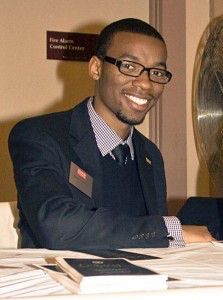
When College of Fine Arts sophomore Dexter McCoy became president of Umoja, Boston University’s black student union, he said it enabled him to lead an internal transformation that would not only strengthen the club, but also its mission in bringing about racial progress.
“It was important for me to take on the leadership role . . . because I saw it as a great opportunity to finally bring about the change that so many people for so many years had been working to bring about,” McCoy said. “For some reason, other people weren’t able to do it to the extent that we’ve been able to do it this year.”
Umoja has worked to improve its image and relationship with BU since its old leadership faced issues with the administration and community in previous years.
McCoy has served as the instrumental figure behind implementing these changes. Before he became president, Umoja’s relationship with administrators had deteriorated and the black community at BU had been misrepresented.
“Umoja was known for throwing every year the first party of the year,” McCoy said. “In particular, the very last party that Umoja had the year before I got here, some things escalated and got out of hand, which caused a lot of bad press [for] the organization and really took the tension between the organization and the administration over the edge.”
McCoy declined to elaborate on the details, but said Umoja’s new leadership made changes to transform the student group’s image at the beginning of the year. Executive board members met over the summer to discuss how they would revamp Umoja.
The executive board sent a letter to several BU administrators and departments at the start of the academic year, informing them about several changes the board planned to make the student group more professional.
“We said . . . we accept what happened in the past with Umoja, and we acknowledge that this organization for years hasn’t been a very professional organization, but we’re changing that this year,” McCoy said.
McCoy said changes include meeting deadlines, planning ahead for events and giving back to the BU community.
So far, the administration has been responsive to the group’s changes, McCoy said.
Dean of Students Kenneth Elmore said Umoja’s black history celebration, which was held on Saturday, “worked like clockwork.”
“I was impressed because it was a really well-done production,” Elmore said. “A lot of the content was rich.”
Ruha Benjamin, an assistant professor of sociology, signed on as Umoja’s faculty advisor late in the spring semester. She said members have done well in rebuilding the club’s image.
“They made sure that among themselves they had a lot of unity and commitment,” Benjamin said. “It was almost as if they were running an upstart or a new business.”
Members often address issues related to modern-day racism, which Umoja member and CAS sophomore Crystal-Angelee Burrell said the group tries to fix.
“The more together the community itself is, the better suited it is to face racism externally,” Burrell said. “They sort of strive to mend internal problems, which is good because you can’t really fight racism if you can’t be true to yourself first.”
Another issue Umoja has faced is the level of tension between the student group and Student Union, which McCoy said has historically been high.
“The question has been raised multiple times, ‘Why do you need a black student union? Why can’t there just be student union?’” McCoy said. “That in general has caused a lot of issues.”
While McCoy noted Student Union has become more flexible about this issue, he said Umoja differs in that it focuses on uniting students of all races and ethnicities and educating them about the black experience on campus and in the U.S.
“For me, it warms my heart every time that I see people together . . . of different backgrounds, cultures [and] lifestyles coming together and focusing on what they have in common . . . rather than their differences,” McCoy said.
Achieving unity throughout BU’s campus, he said, would make Umoja an unstoppable force.
“Everybody who comes out of this institution will be unstoppable,” he said. “People need to realize that they can do whatever . . . they want to do in their life if they put their mind to it and lean on their community for support.”